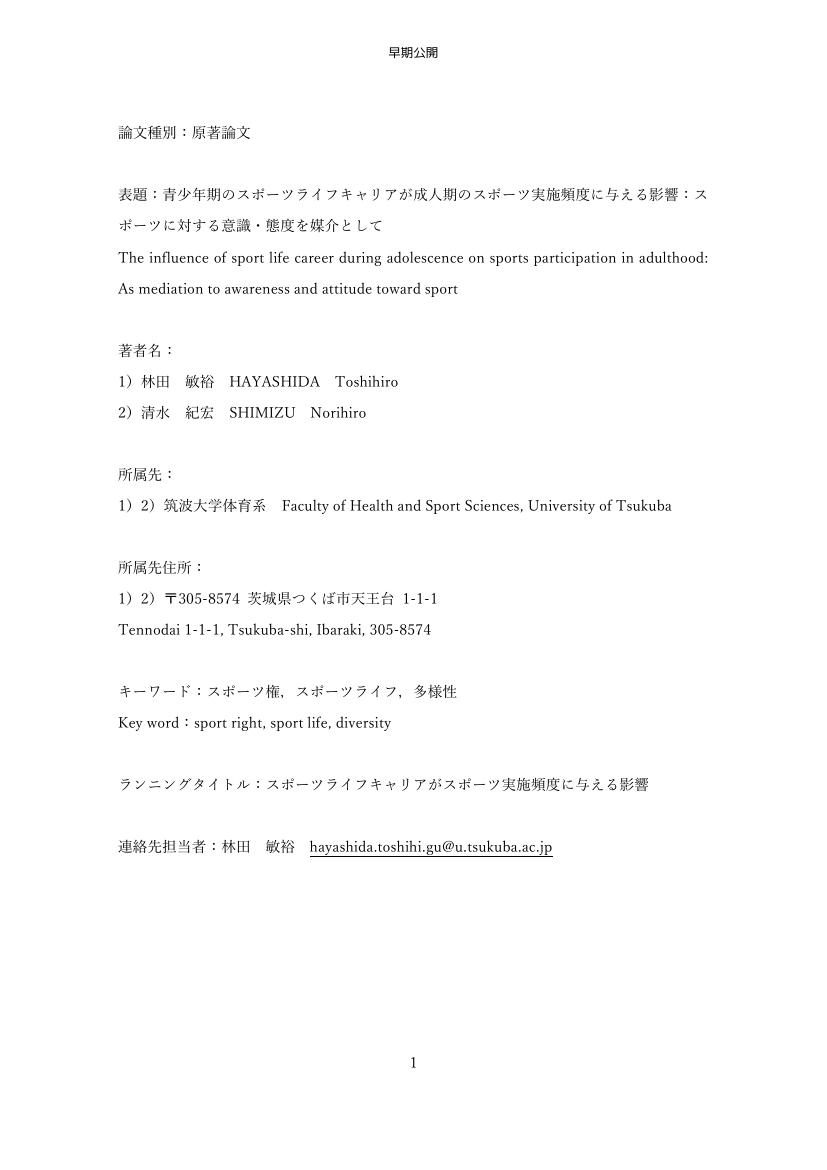33 0 0 0 OA オリンピックと格差・不平等
- 著者
- 清水 紀宏
- 出版者
- 日本体育・スポーツ経営学会
- 雑誌
- 体育・スポーツ経営学研究 (ISSN:24323462)
- 巻号頁・発行日
- vol.30, pp.29-41, 2017-03-31 (Released:2019-09-07)
- 参考文献数
- 35
7 0 0 0 OA 児童の体力および学力と家庭環境との複合的関連
- 著者
- 大坪 健太 春日 晃章 清水 紀宏 中野 貴博
- 出版者
- 日本体育測定評価学会
- 雑誌
- 体育測定評価研究 (ISSN:13471309)
- 巻号頁・発行日
- pp.jjtehpe.HPM202301, (Released:2023-01-31)
The purpose of this study was to identify contributors that are beneficial for both physical fitness and academic achievement in children. To achieve this, multiple factors were investigated in the home environment. The study participants consisted of 437 children in the sixth grade of elementary school. Results from their physical fitness and academic tests were obtained. In addition to physical fitness and academic achievement, the average of physical fitness and academic achievement by T-score was calculated and used as the High physical fitness and high academic achievement score. A 68-item questionnaire on home environment was completed by the children's parents or caregivers, and the results were linked to data obtained for physical fitness and academic performance. Single-correlation analysis was conducted with physical fitness, academic achievement, high physical fitness and academic achievement scores. Factors in the home environment that were significantly correlated were also extracted. Multiple regression analysis was conducted with home factors set as the independent variables and the three ability ratings set as dependent variables. Results from the analysis suggested that parent-child involvement in exercise and sport as well as the father's physical competence strongly correlated with an improvement in physical fitness. Factors relating to socioeconomic status, such as the parents educational level as well as expectations for the child to perform well academically, was strongly correlated with academic performance. In addition, in terms of both physical fitness and academic achievement, the parents' educational background, the father's physical competence, and the frequency of parent-child conversations about athletic sports have a strong influence on the child's ability to perform well.
2 0 0 0 OA 子どもの体力・スポーツ格差に関する基礎的実証研究
本研究は、家庭の社会経済的条件と子どもの運動・スポーツ習慣、体力・運動能力との関係を明らかにするとともに、そうした体力・スポーツに関わる格差が、子どもたちの学校生活や社会関係に及ぼす悪影響を検討した。主要な結果は次の通りである。1.世帯収入が多く、学校外スポーツに多くの投資をしている家庭の子どもほど、体力・運動能力は高かった。また、家庭の社会経済的条件は、スポーツ機会の格差を通じて、体力格差や意欲格差を生じさせていた。2.体力の高さは、学校満足感や孤独感などの学会生活変数にもつ大きな影響を及ぼしていた。
1 0 0 0 OA 体罰・暴力根絶最終報告書
- 著者
- 林田 敏裕 清水 紀宏
- 出版者
- 一般社団法人 日本体育・スポーツ・健康学会
- 雑誌
- 体育学研究 (ISSN:04846710)
- 巻号頁・発行日
- pp.20012, (Released:2021-09-07)
1 0 0 0 OA 体育教師の信念が経験と成長に及ぼす影響:「教師イメージ」と「仕事の信念」の構造と機能
- 著者
- 朝倉 雅史 清水 紀宏
- 出版者
- 一般社団法人 日本体育学会
- 雑誌
- 体育学研究 (ISSN:04846710)
- 巻号頁・発行日
- vol.59, no.1, pp.29-51, 2014 (Released:2014-06-13)
- 参考文献数
- 96
- 被引用文献数
- 2
The professional development of a physical education (PE) teacher occurs within a variety of experiences that become resources for the teacher to learn from. However, to gain experience does not necessarily mean development. Development through learning by experience is influenced by the beliefs that the person has. The purpose of this study was to determine the composition and function of PE teacher beliefs—especially “image of what a teacher is” and “vocational beliefs” that influence their professional development. In addition, we classified PE teachers by their beliefs, and examined their development status with a focus on the relevance of experiences for changing a teacher's ideals. A questionnaire survey was conducted. Data were collected from a sample of 634 junior high school and high school PE teachers. The main findings are summarized below. 1) Factor analysis of data revealed that the PE teachers' image of what a teacher is comprised 4 factors: “leader”, “supervisor”, “supporter of learning” and “team member”, and vocational beliefs comprised 7 factors: “emphasizing public values”, “self-actualization”, “pursuit of pioneering teaching practices”, “emphasizing students”, “professional exclusiveness”, “exercise of autonomy” and “research orientation”. 2) The teachers were classified by image of what a teacher is into 2 types: “supervisor” and “supporter”. The teachers were classified by vocational beliefs into 5 types: “self-actualization”, “emphasizing students”, “open-minded beliefs”, “self-righteous” and “close-minded beliefs”. The ratios of young teachers classified into “supervisor” and “emphasizing students” were significantly larger than that of experienced teachers. The ratios of experienced teachers classified into “supporter”, “self-actualization” and “self-righteous” were significantly larger than that of young teachers. 3) Factor analysis of data revealed that experiences comprised 5 factors: “reflecting on teaching practice”, “knowledge acquisition”, “conversing with fellow teachers”, “observing and opening up one's own teaching practices” and “hard experiences”. Experienced teachers were more passive in their experiences, except “knowledge acquisition”, than younger teachers. For more experienced teachers, having positive experiences was more effective for changing ideals. 4) Teachers classified as the “open-minded beliefs” type were more willing to experience a variety of things than the “close-minded beliefs” type teachers. Regression analysis of data revealed that “emphasizing public values”, “pursuit of pioneering teaching practices” and “research orientation” correlated significantly and positively with experience. But “professional exclusiveness”, “exercise of autonomy” and years of service correlated significantly and negatively with experience.


